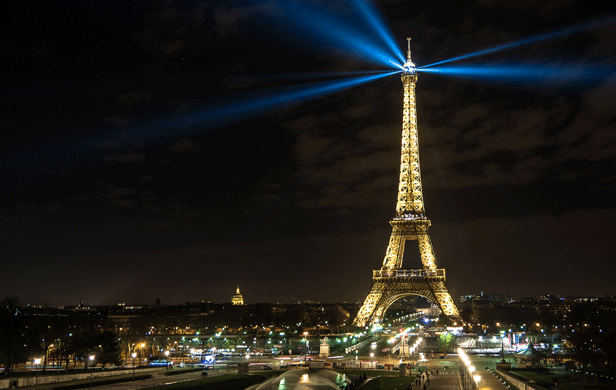
The environmental news of the year — if not the decade — is the United Nations COP21 Climate Agreement reached in Paris on December 12, 2015. The 195 nations of the world reached an understanding in principle to hold global warming “well below 2°C” and to strive to limit the rise to 1.5°C. Elizabeth May, leader of Canada’s Green Party and a long-time attendee at such climate talks, called it “a masterful balancing act” between the ideal and practical. It may not be perfect but it’s something that can be accomplished.
Key parts of the agreement include a contribution from developed nations of $100 billion per year, beginning in 2020, to help developing and undeveloped nations adapt to a low-carbon future. These billions will translate into trillions in private investments in clean and renewable energies. Further, all nations are expected to reach peak greenhouse gas emissions “as soon as possible”, so that by 2050 carbon emissions will not exceed those being captured by “sinks” — essentially creating a carbon neutral planet. And finally, 5-year reviews will examine the progress of all nations toward their committed objectives.
This COP21 agreement couples with a November 2014 unilateral deal between China and the United States to cut their emissions. And adding to the shift in consciousness was a June decision by the G7 nations, the world’s largest economies, to become carbon-free by 2100. Also in June came Laudato Si, the encyclical by Pope Francis which gave profound moral authority to humanity’s obligation to cut carbon emissions.
In Canada, a change in government from Stephen Harper’s Conservatives to Justin Trudeau’s Liberals has literally revolutionized this country’s response to environmental issues generally and to climate change particularly. Instead of being negative and even obstructionist in international COP meetings, Canada has taken a position that is positive and helpful — even being asked to assume a facilitating role in negotiations. Unlike past COP conferences when delegates criticized and ridiculed Canada’s contributions — even suggesting it would be better for everyone if we had not come — we are now being welcomed with smiles and applause.
All these changes will reverberate throughout Canada. The new Liberal government will henceforth include carbon emissions as a considered element in all environmental assessments, including such projects as coal facilities, oil pipelines and LNG plants, thereby reducing the likelihood that such fossil fuel enterprises will proceed. The use and export of these carbon-rich resources will be seriously constrained by ambitious emission targets, periodic monitoring by the United Nations, and international censure for unmet commitments.
The international pressure to reverse global climate change is now immense. This pressure will be passed from the COP21 agreement to individual nations who will, in turn, pass it to their lower echelons of government. In Canada, the initiative taken by provinces, cities and municipalities to reduce emissions will now be met with encouragement instead of indifference. A spirit of co-operation will help Vancouver reach its goal of becoming the world’s greenest city. Alberta’s carbon tax and the cap-and-trade regulations of other provinces will be sanctioned. A moratorium on oil tankers plying BC’s coast and doubts about the province’s LNG projects now fit within a larger and wiser logic.
The world changed on December 12, 2015.


I guess when it’s been all downhill you become grateful when it becomes one step forward, two back. Ms. May, bless her, is cheerleading. What option does she have? Loose targets still detached from science, vague commitments, no enforcement mechanisms, make it a bit of a reach to find the deal inspiring.
We can’t tackle global warming without solutions to overpopulation and our rampant over-consumption. They’re interwoven. You either solve them all or you solve none. Jared Diamond explains that conundrum in “Collapse.”
Even with the limited commitments on emissions reductions that we do have it’s going to take time to implement the requisite measures and the transformation to alternative energy. As the Potsdam Institute’s Hans Joachim Schellnhuber has warned, nothing short of an “induced implosion” of the fossil fuel industry has much chance of succeeding.
Even the Bank of England accepts that, to have any chance of staying within the 2C mark, we need to leave 80% of known fossil fuel reserves untouched, in the ground. That plainly means the highest-carbon/highest-cost carbon fuels, coal and bitumen, should be ‘stranded.’ Unfortunately we are and, as Andrew Nikiforuk so ably chronicles, behave exactly like any petro-state which is why even my own party, the Greens, can’t bring itself to call for the end of Canadian coal and bitumen production.
Thank you, Mo S, whoever you are.
Paris… it is to make you laugh. Or cry.
All that fuel burned to get them to the airport and fly them to another airport where a limo took them to a very nice hotel where they were served nice meals and only the finest of wines so they could….
ohmigawd, such a party!
and for what?
Agreed, Anne Cameron and MoS.
Did the future – a future – ever have a seat at the table in Paris, or was it only another course on the menu?!
Indigenous peoples, rights of nature, human rights, and the growing “Leave-It-In-The-Ground” movement, all virtually locked outside the front door, while the greenwash corporations and policy-makers were let in through the back door. The fact remains that the powers-that-be remain either too incompetent, myopic, greedy, or plain unwilling – by dint of their own diplomatic deformation – to steer their ships free of current ecological paradigms and models of so-called “development”. Best the rest of us can do is try to change these trajectories on the local, regional, national levels with whatever means, whatever tools, we have available. And communicate, coordinate, with like communities around the world.
Happily, yes happily, the World Climate Summit caused little stir in the hearts, minds, and lives of most ordinary people. So much for idealism. And the cynicism it often breeds, in my opinion.